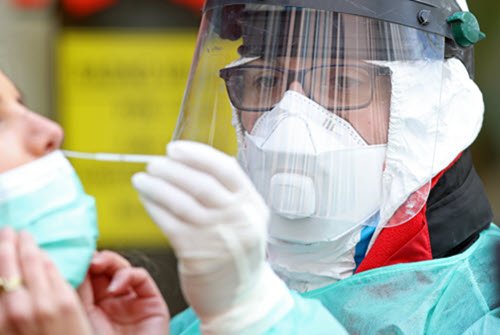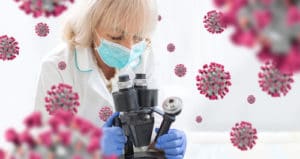What Is An Infectious Disease Doctor And What Does This Medical Specialist Do?
With the ongoing COVID-19 pandemic, infectious disease doctors, also known as ID specialists, are in the health care spotlight more than ever. However, most people are not aware of what an infectious disease specialist or their job entails. An Infectious disease doctor is a board-certified MD or DO physician that treats acute and chronic infections caused by bacteria, parasites, fungi, and viruses, including COVID-19. More specifically, these fellowship-trained health care providers treat:
What Does An Infectious Disease Doctor Treat?
Infectious disease specialists treat a wide variety of acute and chronic medical infections and diseases. ID doctors commonly treat polymicrobial infections (infections involving more than one organism). Common bacterial infections may be caused by Staph aureus, Escherichia coli, and Pseudomonas aeruginosa. Bacterial infections can affect the bone (osteomyelitis), heart valves (endocarditis), blood (bacteremia), or prosthetic surgery implants. Viral or fungal organisms may cause other conditions. Fungal infections can either be acute or chronic such as blastomycosis and aspergillosis. In clinics, ID specialists primarily treat chronic diseases such as HIV and hepatitis. Still, they may also follow up with previously hospitalized patients and see patients with lingering conditions or sub-acute infections.
How To Become An ID Doctor – Education And Training
The path to becoming an Infectious disease doctor is long, arduous, and requires a lot of work. The first step is getting accepted to medical school. This involves completion of pre-requisite courses, volunteering, shadowing, research, and much more. Upon completing medical school and receiving a medical degree, a three-year training residency in internal medicine is needed. A two-year training fellowship in infectious diseases is completed following internal medicine residency and passing internal medicine board examinations. The final step to becoming an ID physician is passing the infectious disease board exam, after which they can finally practice as ID specialists.

ID specialist doing covid test 
infectious disease specialist consulting
How Do ID Specialists Work With Other Physicians?
An Infectious disease specialist will work hand in hand with many other types of the health clinic and hospital physicians. In the hospital, they work on a consulting basis. Hospitalists serve as the primary health care practitioners that take care of hospitalized patients. However, when a patient’s case is particularly complex, hospitalist physicians will consult with ID specialists. The hospitalist physician will still be the primary physician on the patient’s care team. However, ID specialists will also be able to help manage the patient’s care. Usually, ID specialists will focus on the infectious etiology by adjusting antibiotic and antifungal medications while leaving other medical issues and symptoms to the hospitalist.
ID physicians usually treat patients referred to them in the clinics or are follow-up appointments of previously hospitalized patients. For example, a family medicine physician or GP (general practice) may notice a patient’s elevated liver enzymes on routine screening. This warrants further workup and screening for hepatitis by the primary care physician or GP. If a patient has a positive hepatitis test indicative of infection, they are referred to ID specialists. The ID physician will see the patient in the clinic and order a further workup to determine the degree of liver damage, hepatitis viral load, and hepatitis viral strain. Following complete workup, the patient can begin treatment of their hepatitis. With new advancements in the treatment of hepatitis, the virus is usually completely irradicated within two months of clinic treatment.
Infectious Disease Subspecialties
Following completion of a two-year Infectious disease fellowship, there are several subspecialty areas of focus that an ID specialist can train in:
The Infectious Disease Specialist And COVID 19 Care
With specialized training in treating infections caused by fungi, bacteria, and viruses, infectious disease specialists are at the forefront of clinically treating COVID 19 infected patients. Additional training completed by ID specialists in epidemiology makes them experts in the spread of the disease. In many hospitals nationwide, ID doctors are serving as heads of COVID 19 response teams. Nationally, ID doctors are working together to determine best practices and prescribing protocols for newly approved COVID 19 treatments such as remdesmavir, basiliximab, and imdevimab. As COVID 19 lingers on, ID specialists will continue to provide medical care to these Coronavirus-infected patients while conducting clinical research on best-supporting health and medical departments nationwide.
What Are Some Resources Where Can I Find Out More About The Infectious Disease Specialist?
Many excellent medical organizations can provide more information and health care resources about ID specialists, including:
What Is The Study And Research Of Infectious Diseases Called?
Although the term is not commonly used, Infectiology is the term used to describe this health care specialty, and its definition includes the study and clinical treatment of infectious diseases. A medical educator that teaches infectious disease medicine can be referred to as an Infectiologist.
**What is an Infectious Disease Doctor (Infectious Disease Specialist)?**
An Infectious Disease Doctor, also known as an Infectious Disease Specialist, is a medical professional who specializes in the diagnosis, treatment, and prevention of infectious diseases caused by bacteria, viruses, fungi, and parasites. They are experts in the complex interactions between microorganisms and the human body.
**What does an Infectious Disease Doctor do?**
Infectious Disease Doctors perform a wide range of responsibilities, including:
* **Evaluating and diagnosing patients:** Examining patients, reviewing medical history, ordering tests, and interpreting laboratory results to determine the underlying infection.
* **Prescribing and managing treatment:** Administering antibiotics, antifungals, antiviral drugs, and other medications to treat infections.
* **Providing preventive care:** Educating patients on disease prevention measures, such as vaccination and hygiene practices.
* **Consulting with other healthcare professionals:** Collaborating with physicians, nurses, and specialists to develop comprehensive care plans for patients with complex infections.
* **Conducting research:** Participating in clinical trials and research studies to advance the understanding and treatment of infectious diseases.
* **Developing infection control guidelines:** Establishing protocols to prevent and control the spread of infections in healthcare settings and communities.
**Qualifications and Training of Infectious Disease Doctors**
To become an Infectious Disease Specialist, individuals must complete rigorous training:
* **Medical Degree (M.D./D.O.):** Four years of medical school.
* **Residency in Internal Medicine:** Three years of training in general internal medicine.
* **Infectious Disease Fellowship:** Two to three years of specialized training in infectious diseases.
* **Board Certification:** Passing the American Board of Internal Medicine’s Infectious Diseases subspecialty exam.
**Commonly Treated Infections**
Infectious Disease Doctors diagnose and treat a wide range of infections, including:
* **Bacterial Infections:** Pneumonia, urinary tract infections, wound infections
* **Viral Infections:** Influenza, HIV/AIDS, hepatitis
* **Fungal Infections:** Candida infections, athlete’s foot
* **Parasitic Infections:** Malaria, hookworm
**When to See an Infectious Disease Doctor**
Seek consultation with an Infectious Disease Doctor if you have:
* Persistent or recurrent infections
* Infections that are not responding to treatment
* Complex or severe infections
* A weakened immune system
* Recent international travel to areas with known infections







